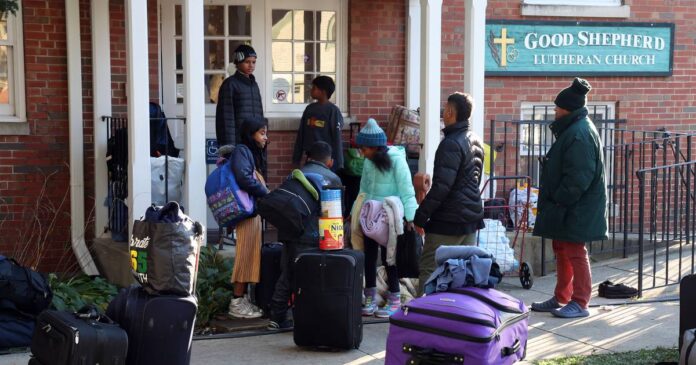Busloads of migrants were brought in the past week to Rosemont and Cicero, officials said, but were turned away.
Several buses from El Paso, Texas, arrived in the past week at the Metra stations in Cicero and in Rosemont near O’Hare International Airport’s remote parking.
Police in Rosemont allowed migrants to get off the buses if they had someone picking them up, but threatened to impound the bus and arrest the driver for endangering the passengers if he let them out, Mayor Brad Stephens said. The Village Board approved an ordinance Monday to back up such measures.
Cicero approved a measure to fine bus companies $750 per person for letting out homeless migrants, spokesman Ray Hanania said.
“It’s wrong to drop people on the street with nowhere to go,” Hanania said. “We think every community should do this to prevent this. They need to force the state to come up with a better plan for homeless people.”
That latest development reflects the varied response suburbs have taken to some 26,000 migrants arriving in Chicago since August 2022 and being sheltered at police stations and the airport.
While city officials struggle with where to house the migrants, the northwest suburbs of Rosemont, Schaumburg and Elk Grove Village have passed ordinances to prevent migrants from being housed in their hotels.
But west suburban Oak Park is paying to house migrants in hotels.
The Oak Park board recently approved $1 million to aid asylum-seeking migrants, most of it from a state grant and federal COVID-19 recovery funds. The proposed funding was reduced by $500,000 after concerns were raised by residents and board members about the sustainability of such spending.
“I consider it a humanitarian crisis,” Village President Vicki Scaman said. “The cold weather in Chicago makes emergency temporary housing necessary.”
However, she added, “It is unsustainable for any one community to do it all by themselves.”
She does not know where the migrants will go when the village’s current funding runs out around the end of January, but hopes that housing advocates will help them find more permanent housing across the region.
If there was more help coordinating and funding the response from the state and federal governments, Scaman said, more local governments would be willing to help.
In Rosemont last month, after a developer proposed lodging migrants in suburban hotels, officials established a $1,000 a month tax on hotel rooms rented out for more than a month, with some exemptions for business travelers.
The intent was to preserve the hotel space for convention business that Rosemont depends on for its convention hall and tourism, Stephens said.
About one-fourth of Rosemont’s 4,000 residents are Hispanic. The mayor said he welcomes legal immigration, but said of the current crisis, “Come on, there’s got to be a better way.”
The city of Chicago still accepts busloads of migrants, but is suing bus companies and seeking the ability to impound buses and fine owners $3,000 if they don’t follow the city’s rules limiting time and frequency of arrivals.
In Schaumburg, officials adopted an ordinance similar to Rosemont’s to tax long-term hotel stays, with exceptions for residents after fires or other emergencies. The intent was to keep hotels for visitors and prevent them from being used for long-term living, village spokeswoman Allison Albrecht said.
Schaumburg has a fairly diverse population, with 31% of residents being foreign-born. State officials assured the village that they are not pursuing any plans to house large groups of migrants in suburban hotels at this time, Albrecht told the Tribune.
Naperville officials developed a plan behind the scenes to handle migrants on an emergency basis only. The seven-page short-term framework identifies the municipal agencies, partners and resources the far west suburb would engage while awaiting further direction from state officials.
Elk Grove Village and Burr Ridge had brief experience housing migrants more than a year ago. Chicago temporarily bused migrants to hotels in those suburbs in September of 2022, over the mayors’ objections, at the outset of the migrant arrivals.
Many migrants have been sent by Texas Gov. Greg Abbott, in protest of immigration policy allowing thousands of migrants to cross the border, which recently reached record highs. Charities with federal funding also reportedly have transported migrants to northern locations.
Elk Grove Village officials passed an ordinance preventing migrants from staying in the village without a doctor’s certification indicating they have no infectious diseases such as malaria or tuberculosis. The village also took action to block its many factories and shopping centers from housing migrants unless they have bathrooms with showers. The village also bought the hotel where migrants had been housed and demolished it, planning future redevelopment.
“It shouldn’t be all these mayors fixing the problem,” Mayor Craig Johnson said. “It’s not our job. We’re not built to handle this. Hopefully, the federal government says, OK, let’s fix this problem.”
Other suburban governments, such as Elgin and Lake County, have obtained state grants to help migrants. But pushback from residents forced Joliet Township to reject its $8.6 million grant.
It would be more stable and much cheaper to house arriving families in apartments, which are made for long-term living, rather than hotels, Stephens suggested. But he said first the migrants need federal work permits to get jobs, fearing that people with no work and free hotel rooms would take advantage of the situation.
“It’s like when a teenager says my parents are gone, let’s have a party, and the whole school shows up,” he said.
As a Republican state representative, Stephens also questioned how the state will pay an additional $160 million that Gov. J.B. Pritzker authorized for migrants. While Chicago is a sanctuary city and Illinois a sanctuary state, which prevents police from cooperating with immigration officials, Stephens said there must be a comprehensive plan to handle migrants now that they are coming in large numbers.




